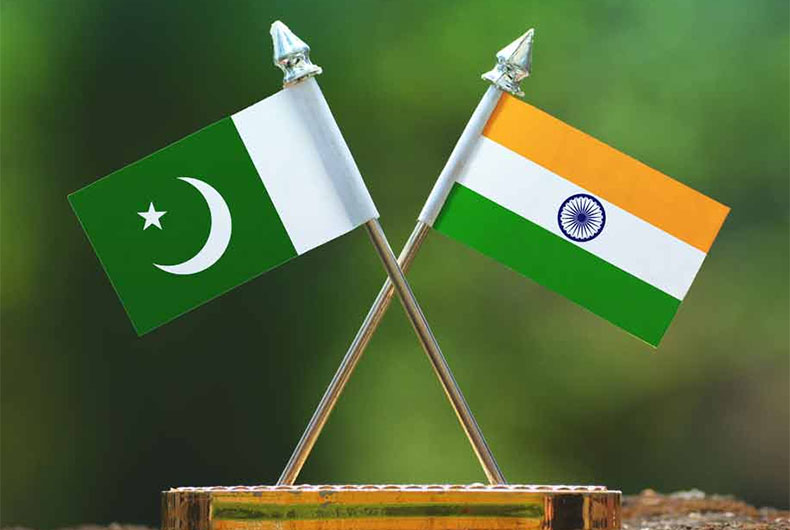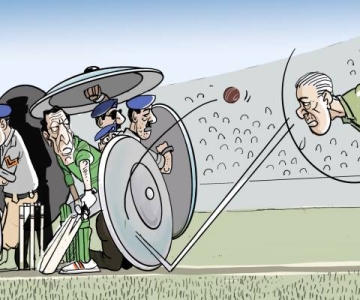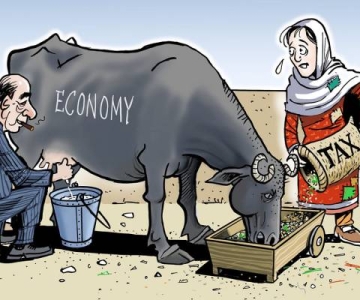The Indian foreign secretary’s visit to Islamabad last week generated much interest but the outcome was the usual bureaucratic statements amounting to nothing. The stalemate, however, was broken and the US a keen supporter of the dialogue welcomed the meeting between the top diplomats of India and Pakistan. Prime Minister Nawaz Sharif also met with the foreign secretary from New Delhi. The talks, as we know, were about further talks. It is a pity that since August 2014, diplomatic channels of communication were stalled. The Indian prime minister’s decision to call off the earlier round in 2014 was unwise and even some Indian commentators had criticised it. Perhaps, domestic dictates, especially of the elections in Indian-occupied Jammu & Kashmir (J&K), necessitated a hardline by Narendra Modi. Now that the elections are over and the BJP has forged a coalition government with a soft-separatist party, the domestic calculus may have changed. Despite the Hindu nationalist credentials of Mr Modi, striving for normalisation is a course that he is likely to adopt. Even more so, as India’s economic transformation appears to be his priority, and without a stable region, that goal is hard to realise.
The recent talks, according to the respective statements, reiterated a familiar mantra: Mumbai, Samjhauta Express, trading of allegations of involvement of domestic militancy faced by both countries. The worrying increase in violence along the Line of Control and the Working Boundary were also discussed. Once again, the soft confidence-building measures, such as people-to-people contact, religious tourism and sports were brought up as the panacea to a bitter, twisted legacy of this bilateral relationship.
The core issue here and its neither terrorism nor Kashmir is the way the two states view each other. Pakistan’s foreign policy framework, shaped by the late Zulfikar Ali Bhutto and later by the military, views India as the key reason for Pakistan’s dismemberment in 1971. This is a view that has now permeated through three generations that have grown up since then and has become akin to the truth. India, moving from its initial contempt for an unworkable (and later disintegrated) state, since the 1980s, has found terrorism as the policy framework to view Pakistan. Not that the Pakistan-based groups have helped matters. In fact, the attacks on the Indian parliament and later the Mumbai attacks have considerably shaped the security-driven public discourse in India where Pakistan is often cited as the epicentre of terrorism and it is put out that it is out to bleed India whenever it can.
There were ruptures in these mutually reinforcing policy frameworks: Nawaz Sharif and Atal Behari Vajpayee and later Pervez Musharraf’s unprecedented positions on sidelining or even ignoring the UN resolutions pertaining to Kashmir. This led to the famed four-point formula on Kashmir and by extension, the bilateral relations: de-militarisation, self-governance, soft borders and joint control over the disputed territories. And that the architect and executioner of Plan Kargil was leading it, was quite a historic moment. But we know what happened to Musharraf. Within two years of reaching close to an agreement (an aide of former Indian prime minister Manmohan Singh and Pakistan’s foreign minister confirmed it), Musharraf was ousted. As noted by his foreign minister Khurshid Kasuri, Musharraf was on the path of a paradigm shift with respect to the India policy. In hindsight, that India policy is far more enduring than Pakistan’s temporal policymakers.
On the Indian side, with a lack of a cohesive Pakistan policy (knee-jerk populism is difficult to brand as policy), cutting off ties is often seen as a form of punishment. This is supported by conservative sections of Delhi and is cheered by media talking heads without realising that this leads to nothing except a vindication of prophecies made by anti-India quarters within Pakistan. Nawaz Sharif’s snubbing in August 2014 cost him a lot. His keenness to promote trade was lampooned on national TV and we were back to square one. If anything, India has had to backtrack on its conditions imposed for talks with Pakistan. The most recent case was in Thimpu in 2010 where despite the post-Mumbai hysteria, the no-talks policy instrument had to be majorly reversed. This was done because realism prevailed and that is what works when two states with an acrimonious past and misgivings interact. It is almost quixotic to suggest that in this day and age, there can be no regular parleys on border management, nuclear installations, drugs, hapless fishermen caught in the web of fragile nationalisms and professional diplomatic engagement.
Taking this a little further, it is also unwise to view separatist sentiments in J&K solely as Pakistan-sponsored. That whitewashes the mis-governance and all the mistakes that India has committed. Kashmiris have no love lost for Pakistan either if the corpus of opinion polls held there is carefully analysed. Support from Pakistan is tactical and used as a leverage at best. It is a separate matter that many in Pakistan are certain that Kashmiris are dying to join Pakistan if given a chance. But these are issues that Indian policymakers will have to deliberate.
On our side, we are trapped by narratives. Since 1947, by making the liberation of Kashmir the lynchpin of Pakistani statehood, we have drifted into a morass. It is no longer just the Pakistan military that sees India as the bete noir of the country’s existence. A large section of Pakistanis also adheres to this long-running strategic culture. It permeates through our education system, our discourses, popular culture and political agendas, too. No wonder then that an otherwise sensible Bilawal Bhutto Zardari had to espouse the Kashmir issue as the first step towards his entry into mainstream politics. There are constituencies hard and soft that he has to pander to in order to remain relevant.
These days, there is much debate on the establishment’s paradigm shift. Yes, the policy on good and bad Taliban is clearer than ever before but there is little or no change in the India-centric security view. Not that it can or will change in a month or a year. But the popular narrative is that the Pakistani Taliban the enemy of the month are India-sponsored. A recent box office hit, Waar (with dialogue in English) even depicted the India-Taliban nexus for the educated, upwardly mobile middle classes who matter in the Pakistan of tomorrow. So, it’s not just the army cantonments or the hyper-nationalist commentators in popular media. Nevertheless, such opinions are not irreversible and a sizeable number of Pakistanis, especially in the smaller provinces, resist these influences as well.
This is the time for those at the helm of affairs to re-evaluate the gains and losses of Pakistan’s India policy. First, Pakistan has nuclear prowess, thereby calling for a review of the threat perception. Second, as the TTP have fallen into other hands, this might be the time to consider the costs of following the proxy strategy. Third, Pakistan’s economy needs to expand and there is no short-term route to this but to enhance trade with India. Fourth, internal reform within the establishment may be in order. Fifth, acknowledging that the spectre of extremism is an offshoot of using religion as a tool of defence (and domestic politics). Sixth, re-assuring all neighbours (including China) that the Pakistani state is not a patron of extremism; and finally, refocusing on internal healing that would include finding political options for the Baloch problem and rehabilitating militants. For this to happen, Nawaz Sharif should be enabled to pursue a path of normalisation and de-link future engagement with India from the ghosts of the past.



